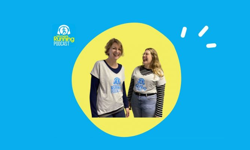
Fifteen years ago, the HistoryExtra Podcast was born.
Dave Musgrove, then editor of BBC History magazine, was going to interview Professor Ian Kershaw for a feature in the magazine and thought, “why not record it?”
“I’d heard talk of this podcasting thing; let’s put it out.” The result: “some people listened and we thought we’re onto something here.”
150 million downloads is testimony to that. How have they managed to be so successful? Dave, who is now content director, history, at Immediate Media, is the latest guest on our own podcast (which is, err, currently a few million downloads behind his), so I thought I would try and pick up a few tips.
This is what I learnt:
- Have an evergreen and bottomless pool of content which has global appeal. When a UK publisher can put out a successful episode on medieval Ethiopia, you know you’ve hit the sweet spot.
- Get the basics right. People are lending you their ear, so “invest in tech and kit and time spent with the interviewee”. A simple thing like running through an audio check list with the interviewee makes all the difference.
- Find a formula and frequency and stick with it, but make sure it’s sustainable.
- Keep it simple – especially in the early days. “Find a format you can do; best not to get ahead of yourself at the beginning.”
- Make the content the star. Celebrity and personality driven podcasts can have limited lifespans.
- Play to your strengths. The podcast was an extension of what they were doing anyway: interviewing eminent historians.
- Spread the load. The HistoryExtra Podcast is not one person but a range of voices. There is a roster of about ten people who share the interviews, which makes it manageable and fun.
- Keep it fresh. Over time, they’ve introduced new formats, for instance the popular ‘everything you want to know about…’ series which involves the audience submitting questions ahead of time about a given subject (eg the Black Death) and a panel then being assembled to answer the questions. They are also getting into multi-part narrative series and experimenting with shorter form podcasting.
The History Extra Podcast started life as a marketing tool, to build reach. It continues to do that, but now also makes money it its own right through ads and its participation in Apple Podcast Subscriptions.
It’s a golden formula – download numbers keep going up and new history keeps being made. What a nice place to be.
You can catch James Evelegh’s regular column in the InPubWeekly newsletter, which you can register to receive here.










